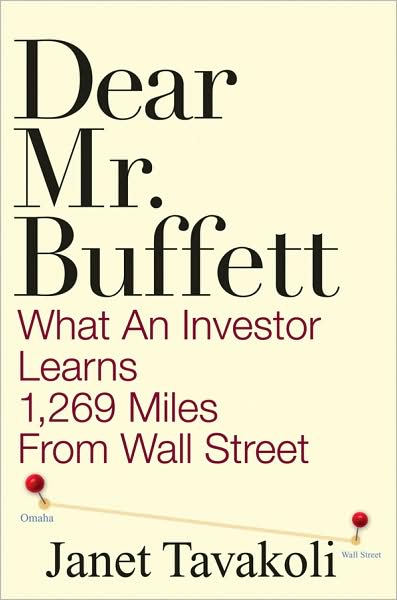Book Review: Dear Mr. Buffett
This is not your ordinary Buffett book.? In one sense, that is because it is not a Buffett book.? When I read other early reviews on the web, I concluded that they hadn’t read the book.? I read almost all of the books that I review at my blog.? If I have not read the book, but have skimmed it, I tell you so in the first few paragraphs.? I also purposely avoid reading the stuff that the PR flacks include with the books.? I find it fascinating how many reviewers rely on the crutches provided.
Why is this not an ordinary Buffett book?? Because it concerns how an expert on derivatives came to know Mr. Buffett, and how the current crises were seen in advance by both of them.? This book’s greatest strength comes from its ability to explain the messes we are currently in.? No solutions, mind you, and Mr. Buffett ain’t handing out any of those either, but understanding how we got to where we are is of value, and Janet Tavakoli is nothing if not a good writer on those points.
There is a second theme — how a derivatives expert came to appreciate value investing.? After all, when short term investing is focused on a variety of arbitrage situations, why not think long, and look for long term capital appreciation?
In the book, much of the current crisis gets examined up through September 2008.? Unlike many, she was right in advance on many of the topics that would eventually bite us:
- CDOs
- Subprime mortgages
- Hedge fund underperformance
- Failing Financial Guarantors
- And more…
She also disses the overrated Nassim Taleb, saying that the current events are not a “black swan,” but predictable, given the overage of leverage.? I agree, having written about these thing before the bust hit, while still admiring Taleb’s focus on nonlinearity and feedback cycles.
Janet Tavakoli and Warren Buffett share a similar philosophy on derivatives.? That is what motivates this book.
- How can they be a systemic hazard?
- How might one use them properly?
I heartily recommend this book.? One reading this will understand our current crisis very well, and will gain in his understanding of how our markets work.? That said, the virtues of the book do not come from Mr. Buffett, but from one who intelligently admires his views on derivatives and other matters.
You can buy the book here: Dear Mr. Buffett: What An Investor Learns 1,269 Miles From Wall Street
PS — I write book reviews, and I hope you like them, because unlike other reviewers, I read the books.? I use Amazon because their service is good, and they offer a fair commision to those influencing those that buy through them.? My view is that if you need to buy something through Amazon, entering the site through one of my links will not increase your costs, and I will get a small commission.? Thanks to all who buy on Amazon through me.


